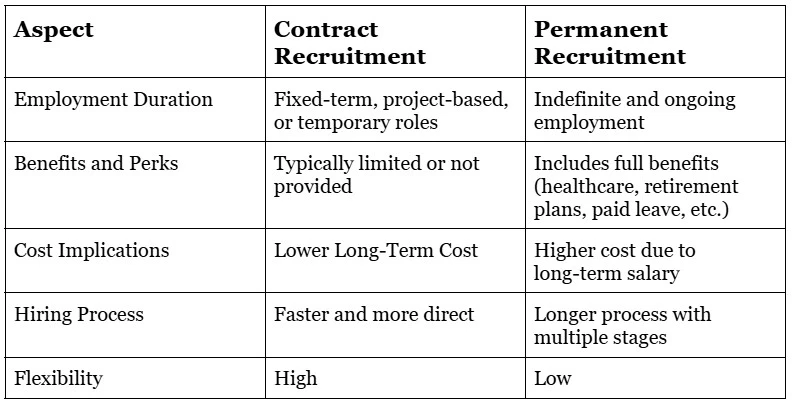Contract Recruitment: What Is It and How Does It Work?
What is contract recruitment? This question is becoming increasingly relevant as companies seek flexible solutions for hiring. Contract recruitment simply means the hiring of employees for a fixed duration of time, typically on the basis of specific project requirements. And unlike permanent recruitment, contract hiring offers businesses flexibility at a lower price point and access to specialized talent without the long-term commitment.
This blog will talk about all the ins and outs of contract hiring, the advantages of contract recruitment, a detailed contract vs permanent recruitment comparison, and provide an overview of the temporary staffing process.
What Is Contract Recruitment?

Contract recruiting is the practice of hiring employees for a temporary period. For a fixed engagement period or until the work is completed, workers will be hired on a contractual basis.
The main intention is hiring short-term while avoiding commitments associated with being a permanent employee, such as benefits, severance, or long-term payroll obligations. The duration of a contract can range from a few weeks to months or years, depending on the agreement.
How Contract Hiring Works: A Step-by-Step Overview
For companies looking to keep things flexible and efficient, and candidates interested in the possibility of a non-permanent position, understanding how contract hiring works is useful for both parties. Here is the step-by-step overview of how contract hiring works:
1. Recognizing the Need for Contract Staff: The first step to understanding how contract hiring works is identifying a temporary requirement. This could be based on seasonal work, project-based requirements, or simply to cover for a full-time employee’s absence.
2. Outlining Job Roles and Duration: When outlining a contract role, you will have a much clearer picture of the responsibilities, skills, work schedule, and contract duration. This makes it easier to find the right candidates and will also align expectations right from the start.
3. Candidate Sourcing: Employers can source candidates by placing ads on their own or by working with a staffing agency that specializes in contract recruitment.
4. Screening and Interviewing: Candidates are judged based on their resumes, in interviews, and, in some cases, through tests that confirm they have the competencies necessary to be successful. This step verifies there is a strong alignment between the worker and the position.
5. Contract and Agreement: After deciding upon a suitable candidate, a formal contract or agreement is signed. The contract or agreement outlines the terms of employment, payment, confidentiality obligations, and the period of work, which is a critical aspect of the contract employed approach.
6. Onboarding Process: Even though contractors may only be in position temporarily, onboarding them properly is important. Contractors will be introduced to company processes, teams, and tools to support their fast entry to value in the work.
7. Monitoring and Feedback: During the period of the assignment, performance would be monitored, and feedback may be communicated. One of the advantages of contract recruitment is the flexibility it provides.
8. Completion or Extension of Contract: As the contract comes to an end, organizations may extend the contract, convert the contractor to a permanent employee, or let the agreement lapse. The flexibility to do this accurately factored into why contract recruitment is increasing in popularity.
Benefits of Contract Recruitment
Contract recruitment has many benefits that make it the best option for organizations in all sectors:
1. Flexibility and Agility: Contract recruitment gives companies options in staffing depending on workloads or project scope, without the obligation of permanent hires.
2. Cost Efficiency: Using contract recruitment limits an employer’s taxable overhead. There are no long-term benefits, pensions, or severance benefits that typically go with full-time employment
3. Access to Specialized Skills: One of the biggest advantages of utilizing contract recruitment is the ability to hire skilled talent for particular tasks or projects.
4. Faster Hiring Process: Contract recruitment typically has a faster process since the roles are generally disclosed and the criteria are more defined. This makes it much faster to fill roles and causes less downtime.
5. Reduced Risk: Since contract roles are naturally temporary, companies do not take on risk if market demands shift. Contract recruitment offers business flexibility without the complications of laying off permanent staff.
Contract vs Permanent Recruitment: What’s the Difference?
While both contract and permanent recruitment aim to fill roles within an organization, they differ significantly in several aspects:

Temporary Staffing Process Explained: How It Works and Why It Matters
The temporary staffing process is a type of contract recruitment, primarily used by companies that need extra personnel on short notice. These relationships are typically short-term in nature, for example, when short-term project-based work must be performed on a tight deadline.
Here is the process of how each step in the temporary staffing works:
Step 1: Note Your Needs: The employer identifies an immediate need for additional employees due to workload spikes, seasonal or spontaneous demands, and employee absences, which are often at least three reasons for a short-term need.
Step 2: Make Contact with the Agency: The company calls or emails the temporary staffing company and deals with the short-term staffing partners who can best supply skilled temporary workers in a timely fashion.
Step 3: Identify Job Requirements: The employer identifies the job, including skills, experience, length of employment, shifts, and pay rate, among other requirements.
Step 4: Find Candidates and Candidate Briefing: The temporary staffing company provides suitable worker candidates from their existing database or through external sources, and contacts workers to perform initial screening and first interviews.
Step 5: Select and Assign: The employer and temporary staffing company select the best-fit candidates and assign them to the employer’s site for employment to begin, either immediately or at the date/time identified by both parties.
Step 6: Orientation/Training: The staffing company provides a brief orientation and sets out the job-specific training, or the employer provides the basic orientation and then job-specific training of the temporary staff worker.
Step 7: Time-tracking and Supervision: The staffing company tracks the work hours of the temporary staff worker, and typically, the employer supervises the temporary staff worker.
Step 8: Payroll and Compliance: The staffing company processes the payroll, taxes, insurance requirements, and compliance associated with hiring temporary employees.
Step 9: End of Contract or Extension: The temporary staff worker is released after the contractual period or they are extended, and the client is charged for the extension.
Final Take on Contract Recruitment
Contract recruitment is an effective workforce strategy that offers flexibility, cost savings, and access to specialized talent. Knowing what contract recruitment is and how contract hiring works will allow a company to implement temporary staffing strategies to remain flexible and competitive.
The advantages of contract recruitment vs permanent recruitment can make it a practical option for many companies that operate in unpredictable markets. With a solid understanding of the temporary staffing process outlined here, employment agencies can refine their hiring processes, and job seekers are able to navigate contract positions more effectively.
Finding yourself streamlining your workforce with flexible, highly skilled independent contractors? Using an established IT recruitment agency will simplify your contract recruitment needs and allow you to place the right candidates into the right assignments quickly. Let Time Agency Group know about your business. We will help you find the best staffing solutions for your operation.
FAQs about Contract Recruitment
Q1. What is contract recruitment?
Contract recruitment is hiring employees for a limited period, with a fixed contract for work on a specific project.
Q2. How does contract hiring work?
Contract recruitment involves sourcing, screening, and placing candidates on temporary, short-term contracts, depending on the business requirement.
Q3. What are the benefits of contract recruitment?
The main benefits of contract recruitment include greater flexibility in the workforce, cost savings, and access to specialised skills for short/medium-term periods with no long-term commitment, such as in some permanent hiring situations.
Q4. How is contract recruitment different from permanent recruitment?
Contract recruitment usually means that you will appoint a temporary contract employee who may have limited benefits, whilst permanent recruitment suggests an ongoing employment role with full benefits from the day they commence.
Q5. Who employs contract staff, the company or a staffing agency?
Both companies can hire a contract employee directly, or work with a recruitment agency that focuses on contract recruitment.
Q6. Can company contract staff become permanent employees?
Yes, many companies make contract employees permanent after an assessment period to showcase their capabilities and performance.
Q7. What industries still use contract recruitment?
IT, healthcare, construction, and finance are all traditional domains for contract recruitment due to the project-based nature of their work.
Q8. What is the average period of a contract recruitment assignment?
There is no average period. Contracts can vary from several weeks to several months or years, depending on the project-based requirement.
Related Article: Direct Hire vs Contract Hire: Which Is Better for You?






